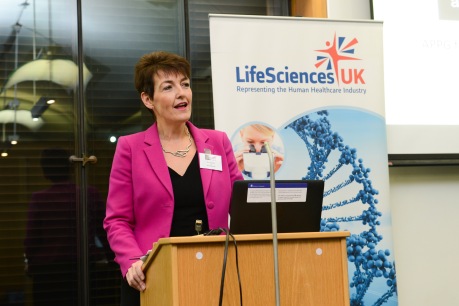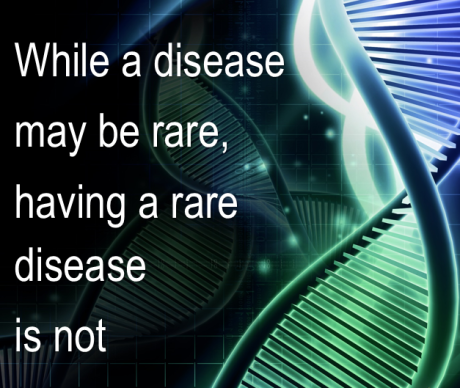Guest blog: Ensuring access to innovative treatments for rare diseases

Marking Rare Disease Day 2017, our guest blog today comes from Jo Churchill MP, Chair of the All Party groups for Medical Research and Personalised Medicine.
Today hundreds of patient organisations from countries all over the world will host activities marking Rare Disease Day. While a disease may be rare, having a rare disease is not. A rare disease is defined as one that affects less than 1 in 2,000 people, however, 1 in 17 people, will be affected by a rare disease at some point in their lives. This equates to approximately 3.5 million people in the UK. Rare diseases are often chronic or life-threatening and 75% of them affect children. Despite the prevalence and severity of rare diseases, a significant proportion of patients do not have access to the best available care and treatment.
In 2013 the health departments of England, Scotland, Wales and Northern Ireland came together to publish the UK Strategy for Rare Diseases, to ensure that health and social care systems across the four nations provide those living with rare conditions with the highest possible quality of care and treatment, regardless of where they live in the UK.

In October last year however, NHS England and the National Institute for Health and Care Excellence (NICE) published a consultation proposing changes to the way medicines are evaluated and funded, which, if implemented, would see patients with rare diseases in England being denied access to treatments available to patients with the same or similar conditions in Scotland, Wales and Northern Ireland. NHS England and NICE are yet to respond to the consultation, which closed in January, but the original document set out plans for the proposed changes to come in to force on 1st April this year.
Most concerning for patients with very rare conditions is the proposal to introduce a £100,000 cost effectiveness threshold for medicines evaluated via NICE’s Highly Specialised Technology (HST) programme. It is widely acknowledged that cost-effectiveness measures are not appropriate for evaluating medicines for very rare diseases, due to small patient populations and often limited data. In 2014 NICE established the HST programme to address these challenges. The programme provides an alternative evaluation process for medicines for very rare conditions, which gives less weight to cost-effectiveness criteria and considers the impact of medicines beyond their direct health benefits.
Many treatments for very rare conditions that are currently funded by NHS England have cost-effectiveness measures in excess of £500,000, including the three medicines that have been approved by NICE’s HST process to date – Soliris for Atypical haemolytic uraemic syndrome (aHUS) a blood disease; Vimzim for Morquio syndrome, a rare type of birth defect and Translama for Duchenne Muscular Dystrophy. Under the proposed changes, medicines which exceed the £100,000 threshold will be evaluated via NHS England’s prioritisation process. This process is not appropriate for assessing medicines for very rare conditions as it fails to take in to account broader factors such as unmet medical need, burden of illness and impact on patients and carers. The new threshold will therefore, effectively stop the flow of new medicines reaching patients with very rare diseases.
Additionally, the consultation’s broader focus on economic thresholds will disproportionately disadvantage highly innovative, first-to-market drugs, which are often expensive to develop and produce but provide promising treatment options for patients with high unmet need, including patients with very rare conditions. By making it more difficult for patients to access these medicines, the proposed changes could inadvertently make the UK a less appealing prospect for companies considering where to invest and develop their medicines. This could mean fewer opportunities to discover new, potentially life-saving medicines in the future.

The theme of this year’s Rare Disease Day is research. Rare disease research is crucial to providing patients with the answers and solutions they need. As Chair of the two All Party groups covering both Medical Research and Personalised Medicine, I am passionate about finding answers. I am concerned that we ensure collaboration across Europe, and beyond, to enable research into rare diseases, in which I include rare cancers, for patient benefit. I am currently trying to take a Private Members Bill through Parliament, putting the role of the National Data Guardian on a statutory footing. I firmly believe we need to concentrate on two strands; firstly the patient journey, including the support of family and, secondly, the use of consented data for research to find those answers.
I am acutely aware of the difference research can make, whether it’s providing a diagnosis, offering treatment options, or ultimately finding a cure. As the slogan for this year’s Rare Disease Day appropriately explains, ‘with research the possibilities are limitless’. However, this is only the case if research can be used to make innovative medicines and treatments that patients can access. If NHS England and NICE push ahead with their proposed changes they will limit the possibilities, and subsequently limit the treatment options available for patients with very rare conditions.
.png)
.png)